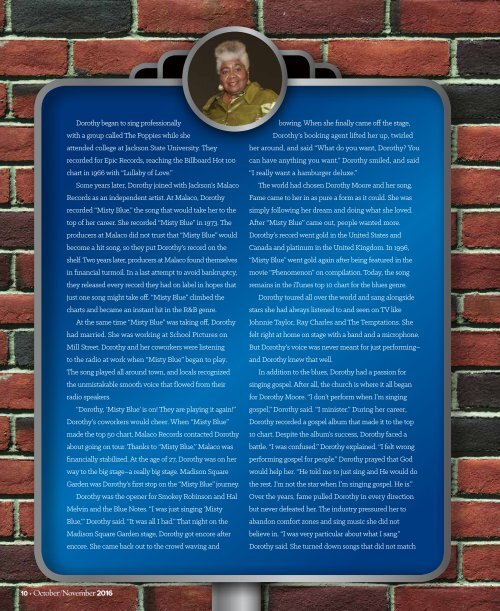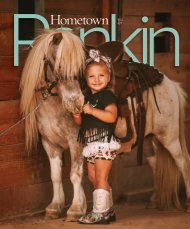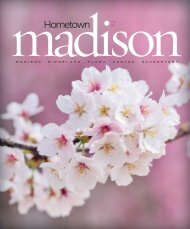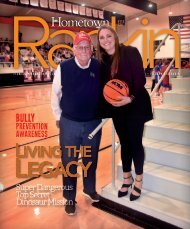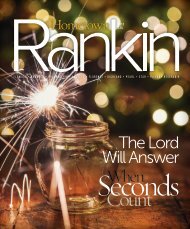You also want an ePaper? Increase the reach of your titles
YUMPU automatically turns print PDFs into web optimized ePapers that Google loves.
Dorothy began to sing professionally<br />
with a group called The Poppies while she<br />
attended college at Jackson State University. They<br />
recorded for Epic Records, reaching the Billboard Hot 100<br />
chart in 1966 with “Lullaby of Love.”<br />
Some years later, Dorothy joined with Jackson’s Malaco<br />
Records as an independent artist. At Malaco, Dorothy<br />
recorded “Misty Blue,” the song that would take her to the<br />
top of her career. She recorded “Misty Blue” in 1973. The<br />
producers at Malaco did not trust that “Misty Blue” would<br />
become a hit song, so they put Dorothy’s record on the<br />
shelf. Two years later, producers at Malaco found themselves<br />
in financial turmoil. In a last attempt to avoid bankruptcy,<br />
they released every record they had on label in hopes that<br />
just one song might take off. “Misty Blue” climbed the<br />
charts and became an instant hit in the R&B genre.<br />
At the same time “Misty Blue” was taking off, Dorothy<br />
had married. She was working at School Pictures on<br />
Mill Street. Dorothy and her coworkers were listening<br />
to the radio at work when “Misty Blue” began to play.<br />
The song played all around town, and locals recognized<br />
the unmistakable smooth voice that flowed from their<br />
radio speakers.<br />
“Dorothy, ‘Misty Blue’ is on! They are playing it again!”<br />
Dorothy’s coworkers would cheer. When “Misty Blue”<br />
made the top 50 chart, Malaco Records contacted Dorothy<br />
about going on tour. Thanks to “Misty Blue,” Malaco was<br />
financially stabilized. At the age of 27, Dorothy was on her<br />
way to the big stage–a really big stage. Madison Square<br />
Garden was Dorothy’s first stop on the “Misty Blue” journey.<br />
Dorothy was the opener for Smokey Robinson and Hal<br />
Melvin and the Blue Notes. “I was just singing ‘Misty<br />
Blue,’” Dorothy said. “It was all I had.” That night on the<br />
Madison Square Garden stage, Dorothy got encore after<br />
encore. She came back out to the crowd waving and<br />
bowing. When she finally came off the stage,<br />
Dorothy’s booking agent lifted her up, twirled<br />
her around, and said “What do you want, Dorothy? You<br />
can have anything you want.” Dorothy smiled, and said<br />
“I really want a hamburger deluxe.”<br />
The world had chosen Dorothy Moore and her song.<br />
Fame came to her in as pure a form as it could. She was<br />
simply following her dream and doing what she loved.<br />
After “Misty Blue” came out, people wanted more.<br />
Dorothy’s record went gold in the United States and<br />
Canada and platinum in the United Kingdom. In 1996,<br />
“Misty Blue” went gold again after being featured in the<br />
movie “Phenomenon” on compilation. Today, the song<br />
remains in the iTunes top 10 chart for the blues genre.<br />
Dorothy toured all over the world and sang alongside<br />
stars she had always listened to and seen on TV like<br />
Johnnie Taylor, Ray Charles and The Temptations. She<br />
felt right at home on stage with a band and a microphone.<br />
But Dorothy’s voice was never meant for just performing–<br />
and Dorothy knew that well.<br />
In addition to the blues, Dorothy had a passion for<br />
singing gospel. After all, the church is where it all began<br />
for Dorothy Moore. “I don’t perform when I’m singing<br />
gospel,” Dorothy said. “I minister.” During her career,<br />
Dorothy recorded a gospel album that made it to the top<br />
10 chart. Despite the album’s success, Dorothy faced a<br />
battle. “I was confused.” Dorothy explained. “I felt wrong<br />
performing gospel for people.” Dorothy prayed that God<br />
would help her. “He told me to just sing and He would do<br />
the rest. I’m not the star when I’m singing gospel. He is.”<br />
Over the years, fame pulled Dorothy in every direction<br />
but never defeated her. The industry pressured her to<br />
abandon comfort zones and sing music she did not<br />
believe in. “I was very particular about what I sang.”<br />
Dorothy said. She turned down songs that did not match<br />
10 • <strong>October</strong>/<strong>November</strong> <strong>2016</strong>


